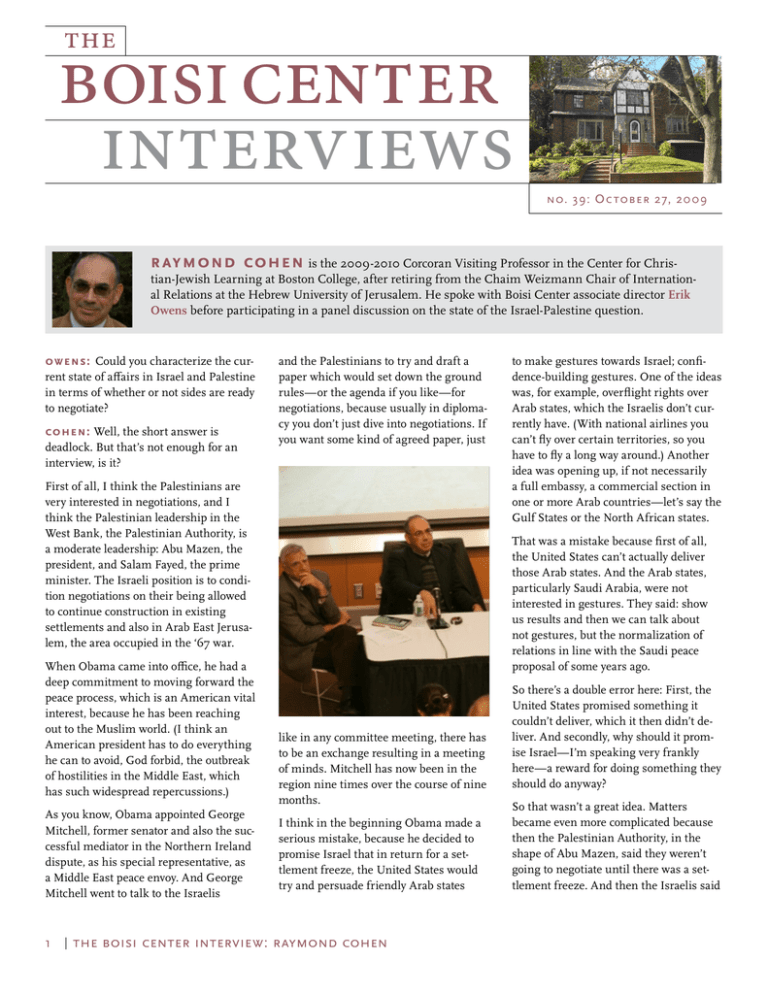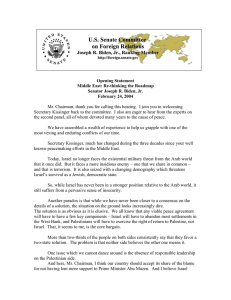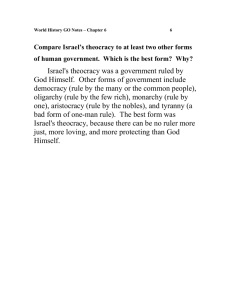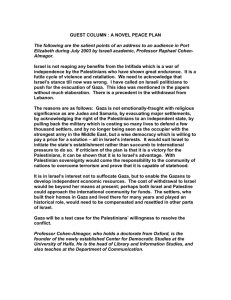raymond cohen
advertisement

the boisi center interviews no. 39: Oc tober 27, 20 09 raymond cohen is the 2009-2010 Corcoran Visiting Professor in the Center for Chris- tian-Jewish Learning at Boston College, after retiring from the Chaim Weizmann Chair of International Relations at the Hebrew University of Jerusalem. He spoke with Boisi Center associate director Erik Owens before participating in a panel discussion on the state of the Israel-Palestine question. owens: Could you characterize the current state of affairs in Israel and Palestine in terms of whether or not sides are ready to negotiate? cohen: Well, the short answer is deadlock. But that’s not enough for an interview, is it? and the Palestinians to try and draft a paper which would set down the ground rules—or the agenda if you like—for negotiations, because usually in diplomacy you don’t just dive into negotiations. If you want some kind of agreed paper, just First of all, I think the Palestinians are very interested in negotiations, and I think the Palestinian leadership in the West Bank, the Palestinian Authority, is a moderate leadership: Abu Mazen, the president, and Salam Fayed, the prime minister. The Israeli position is to condition negotiations on their being allowed to continue construction in existing settlements and also in Arab East Jerusalem, the area occupied in the ‘67 war. When Obama came into office, he had a deep commitment to moving forward the peace process, which is an American vital interest, because he has been reaching out to the Muslim world. (I think an American president has to do everything he can to avoid, God forbid, the outbreak of hostilities in the Middle East, which has such widespread repercussions.) As you know, Obama appointed George Mitchell, former senator and also the successful mediator in the Northern Ireland dispute, as his special representative, as a Middle East peace envoy. And George Mitchell went to talk to the Israelis 1 to make gestures towards Israel; confidence-building gestures. One of the ideas was, for example, overflight rights over Arab states, which the Israelis don’t currently have. (With national airlines you can’t fly over certain territories, so you have to fly a long way around.) Another idea was opening up, if not necessarily a full embassy, a commercial section in one or more Arab countries—let’s say the Gulf States or the North African states. That was a mistake because first of all, the United States can’t actually deliver those Arab states. And the Arab states, particularly Saudi Arabia, were not interested in gestures. They said: show us results and then we can talk about not gestures, but the normalization of relations in line with the Saudi peace proposal of some years ago. like in any committee meeting, there has to be an exchange resulting in a meeting of minds. Mitchell has now been in the region nine times over the course of nine months. I think in the beginning Obama made a serious mistake, because he decided to promise Israel that in return for a settlement freeze, the United States would try and persuade friendly Arab states the boisi center interview: raymond cohen So there’s a double error here: First, the United States promised something it couldn’t deliver, which it then didn’t deliver. And secondly, why should it promise Israel—I’m speaking very frankly here—a reward for doing something they should do anyway? So that wasn’t a great idea. Matters became even more complicated because then the Palestinian Authority, in the shape of Abu Mazen, said they weren’t going to negotiate until there was a settlement freeze. And then the Israelis said that because no gestures were forthcoming, it’s impossible to normalize relations with the Arab world, which is unremittingly hostile. Do you feel that there’s a method that somehow transcends the particularities of any given month or year that should be pursued? Since then, they’ve been talking about talking, and various suggestions keep appearing in the press, and you’re not quite sure to what extent they accurately reflect the talks. For instance, one report said that the Israelis are finally prepared to agree on a settlement freeze on two conditions. First of all, they want to complete 2000 housing units (it’s not quite clear to me if these are already underway or if these are simply projects that have been approved at the planning stage) and Israel will agree to a six-month freeze. According to the Israeli press, the United States has said six months isn’t enough—I don’t know if that correctly reflects what is happening or really addresses the full complexity of the negotiation. cohen: Above all, the key to a negoti- Over the last week, there were two senior Israeli officials in Washington. One is a senior defense official called Mike Herzog, and the other, a very close advisor of Netanyahu, called Yitzhak Molcho. I’ve met both of them and they’re both very bright. Molcho is one of the most prominent lawyers in Israel. And he did a lot of interesting negotiations in the 1990s with Arafat. So he’s a good person. But they were in Washington for a week and they never got anywhere, and they went back home empty-handed a day or two ago. So that isn’t good. If two officials spend a week in Washington, and the American administration has not been able to come up with a document, then that isn’t auspicious. I think the ball is in the court of the United States right now. It has to decide what it’s going to do. owens: What do you feel has been the most successful mode of diplomatic action: sending repeated representatives to the region and shuttling around, holding conferences such as the one in Madrid, bringing negotiations to Camp David and arm wrestling with particular people? 2 ated settlement is mediation, because without the good offices of a third party, the Israelis and the Arabs are not going to get anywhere. And this has been the case, on the whole, since 1949. The person who set the pattern of mediated agreements was a very great American, “Above all, the key to a negotiation settlement is mediation, because without the good of f ices of a third par ty, the Israelis and the Arabs are not going to get any where.” Ralph Bunche, who was Undersecretary of the United Nations. He was an African-American at a very difficult time and his biography, written by Brian Urquhart, is a wonderful book, an inspiring book, because he was a remarkable diplomat. You can learn a lot from reading about his mediating between the Israelis and the Egyptian state in 1949. By the end of the negotiations, both sides were showing each other family photographs. So he was doing something right, wasn’t he? So I would say the key is mediation, and Mitchell is a past master of media- the boisi center interview: raymond cohen tion. You should really be interviewing Mitchell. He’s very determined. He’s very tough. He listens and he listens. He’s very patient, so don’t write him off yet. I don’t know that there are any big secrets to the art of mediation. The United States has a lot of influence both with the Palestinians and the Israelis, and you don’t really need to go beyond that moral suasion. There are certain assets that make mediators on behalf of the United States very effective. Of course, they may have to bring in the president at some point. It might be a letter, it might be a conversation. But the president is always there in the background. Since Jimmy Carter’s tour de force, his thirteen-day marathon at Camp David, the pattern has been for the president to quickly become directly involved. Now, that is not necessarily a great idea. President Bill Clinton probably became too involved personally, and spent too much of his own time on this issue. With the result that in the end, the president, if you like, becomes a hostage of the rivals, because they know that if he doesn’t come up with a deal, he loses face. Since then the United States seems to have reached the conclusion that it is best not to insert the president too directly into – owens: But certainly everyone except the president has been on site: Hillary Clinton, Robert Gates, Dennis Ross... and George Mitchell is practically living there. cohen: Well, Mitchell is a special representative, but you want to have hierarchy. As Abraham Lincoln said, a lawyer who negotiates on his own behalf has a fool for a client. You have to have a cut-out, somebody who can say, no, you didn’t understand my negotiator, he exceeded his brief—even if he didn’t. You’ve got to have that. owens: Can you say a bit about the impact of the Goldstone report? Perhaps a small bit about your view of the content, but also about the impact of that report on the peace process and the general state of affairs there. cohen: Israel made a very serious mistake, because it declined to cooperate with Goldstone. Goldstone is a very distinguished judge and expert on human rights from South Africa. And he’s Jewish. So he wanted to do what is right by Israel, while clearly believing that human rights and the laws of war should be adhered to. Israel made this mistaken decision, which I don’t think they thought through, of declining to cooperate with the commission. So the commission visited Gaza, but they never visited the Israeli towns that were hit by Palestinian projectiles. Where was the sense in that? I think the idea was that we shouldn’t legitimize this commission, we don’t have anything to apologize for, we never chose to fight in Gaza, they were firing at us from Gaza, hiding behind civilians, and so on and so forth. So that was a serious error and Goldstone didn’t hear the Israeli version of events. And he says this himself. What we can learn from the episode is that Israel takes the report very seriously indeed. If you look at the American press, the report is clearly referred to, and you got very good coverage, certainly in the New York Times. But in Israel, it’s become an obsession. They’re stricken to the quick, because first of all, it strikes at the belief, which Israelis do have, that they only fight ethically. Secondly, they claim that it misses the problem of having to fight against an army which hides behind a civilian population and itself doesn’t recognize the laws of war. And the laws of war themselves don’t deal with the problem of terrorism. How do you deal with combatants that don’t wear uniforms? So that’s a serious problem. But Israel has been very deeply, I think, affected by the report. Now, from the point of view of practical diplomacy, it’s given the Americans great leverage, because Israel has been totally 3 dependent on its big buddy, like when we were kids at school and you had a big brother. Did you have a big brother? owens: Yes, I did, but he never defended me like the U.S. did Israel. cohen: You then have to be very nice to your brother, this guy who is helping you out. So Israel owes a lot to the United States, and you don’t need to spell these things out. It’s very clear. I think that gives the United States added leverage over Israel. Goldstone says Israel has to establish its own inquiry. This is what the report requires of Israel, that it must investigate the actions of its military. And in Israel, there’s a very tortured debate about that. Obviously the military hate that. Independent inquiry means that they don’t investigate themselves. owens: Is there a tradition of this, of an independent inquiry? cohen: There is, there is. I can think of a couple: one independent inquiry was after the 1973 war, and it was very critical of the government. It basically brought down the Labor government, which was led by Golda Meir. In the 1980s, after the Sabra and Shatila massacre, the commission of inquiry recommended that Sharon, who was then defense minister, not continue in his post, and he had to re- the boisi center interview: raymond cohen sign. And then, of course, other officials and officers were forced to resign. Israel is a state under the rule of law, so it takes those commissions seriously. In an independent commission, of course there are the modalities of the powers of the judges, the rules of evidence, and so on and so forth. But in principle that’s a very powerful tool, and Israel is not enthusiastic about it today. owens: Many Americans had the sense that the gloves were off until the day before Obama’s inauguration, that the Bush administration authorized the carnage. And I’m not sure that’s really fair, but the IDF was clearly aware of the American election cycle. I wonder if you had any thoughts about how that played itself out from the other side. cohen: I think it wasn’t intended to be—that it wasn’t aimed at the incoming administration. It was intended to make good use of the benevolence of the outgoing administration. That was the point. Because until the president was sworn in on the 20th of January, President Bush was president, and he was very well disposed towards Israel. So I think that was the idea. The Democrats hated it, and I think they made it very clear to Israel that they were not too happy about that timing, which they found embarrassing. So things didn’t get off to a good start, you’re right about that. I think that’s a good insight. One thing that I can’t understand, and I don’t know what your thoughts are, is that Obama seems very reticent. I don’t know why. He makes these great speeches—the Cairo speech and then the UN speech—but in other ways he hasn’t seemed to indicate much sustained interest at a practical level. Now, this may just be because he’s preoccupied with the health bill. I don’t know what you think. Do you think that’s it? owens: Well, my understanding has been that he has been leaning without the results that he’s expected from Netanyahu on the settlement question. He had some sharp words early on in his presidency about settlements, and he seems to have backed off of those in the face of some renewed reluctance. You just mentioned the new haggling over the 2000 units or whether we can expand them to allow families, extended families to live in settlements and all these things. I’m worried that he’s getting nervous, scared about putting himself into the mix there directly. But I’m not sure how focused he is on the middle level. That was my sense from colleagues who work on this issue, that there was great concern about the legitimacy of the blockade to begin with. I’m not really sure. I don’t know what the American prospects are, but Mitchell is the best we have. And we sent Holbrooke to Pakistan and Mitchell to the Middle East, and hopefully they can bring this together. I’m wondering whether you feel that the resolution is a generational issue as opposed to a policy issue, whether in the end, a grand gesture isn’t enough, or a simple plan or a meeting in Madrid, but rather you wait it out for another 50 years. How do you feel about that? cohen: That’s a very interesting idea, and I thought about that. The conclusion I reached was that there is a lot of truth He’s got a lot of big things on his plate right now that I’m certain he wouldn’t want to take his political capital away at that point. He knows nothing’s forthcoming immediately. From the American standpoint, there were commentators firmly supporting the IDF, but the majority was clearly very upset about what was happening in Gaza. A lot of the people who specialize in ‘Just War’ thinking were very upset about it, even those who make it their business to try to say what do you do with terrorists and people who blend into the neighborhood. They were worried about this, in large part because of the preexisting conditions, that Israel had caused so much of the despair in Gaza through the blockade; that this created a dangerous environment for them to bulldoze through. 4 in what you say but there is a problem. The problem is that the longer you wait, the more the settlements expand, and the more radicalized Palestinians become. In fact, I think within not too long a time, at the present rate, a political settlement will become impossible. I could show you on a map certain developments that would really make it difficult just to establish an independent Palestinian state. So facts on the ground, I think, are racing ahead. And because of them, I don’t think that there’s going to be a better moment than now. I think if this opportunity is missed, then in 50 years the present generation of leaders will be criticized for not having exploited what may be their last opportunity. [end] The Boisi Center for Religion and American Public Life Boston College 2 4 Quinc y Road Chestnut Hill, MA 02 467 tel 617 - 55 2-1860 f a x 617 - 55 2-1863 publife@b c .e du Visit bc .e du/boisi-resources for a complete set of the Boisi Center Inter views and audio, video, photographs, and transcripts from our events. the boisi center interview: raymond cohen b oisicenter @b oisi _ center






